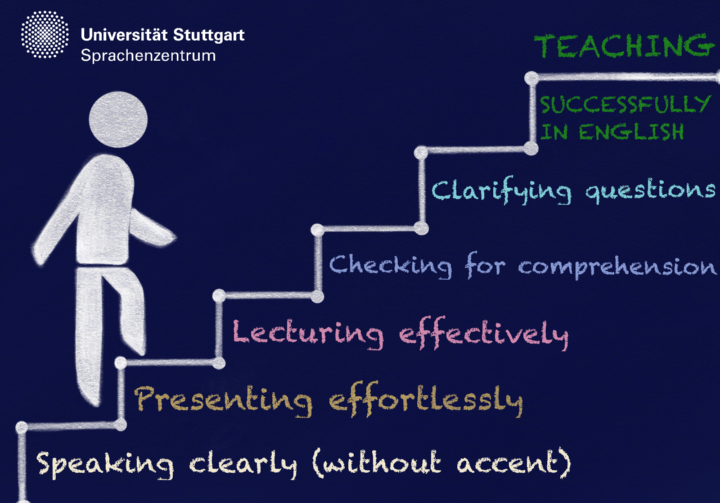With the "EMI Navigator," the team of the Language Center's Teaching Workshop has developed a program at the University of Stuttgart to advise and support instructors in English-language teaching. Professor Cattaneo and the EMI team conducted this pilot project in practice during the winter semester of 2022/23.
There are currently 16 international master’s degrees being taught in English, and that number is expected to increase. Additionally, some bachelor’s programs are looking to incorporate English-language lectures and project work into their existing formats. The Language Center’s university-wide survey on English as a Medium of Instruction (EMI) in May 2022 indicated that the majority of responding students and instructors have a positive view of English offerings. Respondents largely agreed that increasing the offerings taught in English would (1) strengthen students’ job prospects, (2) attract more international students, and (3) attract more international talent. This substantiates the University's strategic goal of being a globally recognized research university.
Accordingly, Gretchen Chojnacki-Herbers, lecturer and language area coordinator at the Language Center, together with her team and with Professor Giorgio Cattaneo, head of the Institute of Biomedical Engineering (BMT) has developed the so-called EMI Navigator. "Our goal is to provide individual support to all lecturers who want to teach in English. Our motto is: you bring the expertise and we help you adapt it to an English-speaking audience," Chojnacki-Herbers says. For example, the EMI team helps lecturers review their English teaching materials, observe lectures and seminars, and provide individual feedback.
Ms. Chojnacki-Herbers developed the foundations for the EMI program in April 2020. The original EMI program offered numerous workshops (including asynchronous material on ILIAS) covering topics such as: lecturing clearly in English, dealing with difficult questions, giving feedback during office hours, explaining equations, and understanding as well as responding to challenging intercultural scenarios.
Seminar as a pilot project: How the EMI Navigator was developed
Inspired by the initial EMI program, Prof. Cattaneo, offered his “Biomedical Implant Engineering” seminar in the winter semester 2022/23, as an English-medium course in partnership with the Lehrwerkstatt as a pilot project. Together, Prof. Cattaneo and Gretchen Chojnacki-Herbers developed the new EMI Navigator format along with the EMI team. Chojnacki-Herbers explains: “We want to bring this support directly to the place where it is the most helpful - the lecture hall.” They collaborated on lecture-note editing, vocabulary building and oral skills. “One of the most effective adaptations was developing vocabulary lists, which Prof. Cattaneo could provide to his students. The emphasis was on students’ comprehension and their ability to explain course concepts in English, while avoiding translation into their native languages. This type of holistic approach supports students’ understanding as much as the professors' communication.”
The EMI team observed lectures twice during the semester in order to analyze the lecturing, and then give specific, detailed feedback later. One advantage of the format is that the EMI coordinator can observe interactions directly in the lecture hall or seminar room and give the instructor feedback to improve communication. What makes the EMI Navigator format unique is ongoing, in-person feedback, and adaptation to the instructors’ needs and wishes. Prof. Cattaneo approves of the fresh approach: “You simply cannot learn this much from a single workshop.”
At the conclusion of Prof. Cattaneo’s course, there was one final feedback meeting, during which the exam questions were analyzed. The goal was to ensure that the phrasing of questions would support the students’ understanding, so that they could demonstrate their knowledge of the subject matter.
Evaluation: Survey of students
Towards the end of the semester, the Lehrwerkstatt’s EMI team conducted a survey of student feedback. The students overwhelmingly agreed that it benefited not only their language ability, but also their future academic and professional prospects. One student commented: “I will definitely take more subject courses in English. I think practicing English is more important than ever, especially in such an interdisciplinary and thus globally connected field.”
With the foundation established with the EMI Navigator, Prof. Cattaneo will be able to continue developing his courses in English, building on his experience through working with the EMI team. He anticipates that colleagues from other institutes and faculties will take advantage of the support offered by the Lehrwerkstatt. As Prof. Cattaneo emphasizes: “I really benefited from the EMI program at the Lehrwerkstatt and I look forward to future collaboration. We are fortunate to have this kind of support at the University.”
If you would like to participate in the EMI Navigator, please feel free to contact the apprenticeship workshop team by email.


